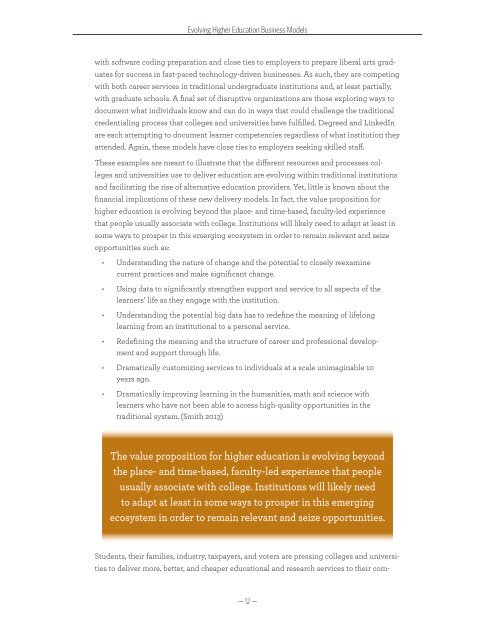Evolving Higher Education Business Models
Evolving-Higher-Education-Business-Models
Evolving-Higher-Education-Business-Models
Create successful ePaper yourself
Turn your PDF publications into a flip-book with our unique Google optimized e-Paper software.
<strong>Evolving</strong> <strong>Higher</strong> <strong>Education</strong> <strong>Business</strong> <strong>Models</strong><br />
with software coding preparation and close ties to employers to prepare liberal arts graduates<br />
for success in fast-paced technology-driven businesses. As such, they are competing<br />
with both career services in traditional undergraduate institutions and, at least partially,<br />
with graduate schools. A final set of disruptive organizations are those exploring ways to<br />
document what individuals know and can do in ways that could challenge the traditional<br />
credentialing process that colleges and universities have fulfilled. Degreed and LinkedIn<br />
are each attempting to document learner competencies regardless of what institution they<br />
attended. Again, these models have close ties to employers seeking skilled staff.<br />
These examples are meant to illustrate that the different resources and processes colleges<br />
and universities use to deliver education are evolving within traditional institutions<br />
and facilitating the rise of alternative education providers. Yet, little is known about the<br />
financial implications of these new delivery models. In fact, the value proposition for<br />
higher education is evolving beyond the place- and time-based, faculty-led experience<br />
that people usually associate with college. Institutions will likely need to adapt at least in<br />
some ways to prosper in this emerging ecosystem in order to remain relevant and seize<br />
opportunities such as:<br />
• Understanding the nature of change and the potential to closely reexamine<br />
current practices and make significant change.<br />
• Using data to significantly strengthen support and service to all aspects of the<br />
learners’ life as they engage with the institution.<br />
• Understanding the potential big data has to redefine the meaning of lifelong<br />
learning from an institutional to a personal service.<br />
• Redefining the meaning and the structure of career and professional development<br />
and support through life.<br />
• Dramatically customizing services to individuals at a scale unimaginable 10<br />
years ago.<br />
• Dramatically improving learning in the humanities, math and science with<br />
learners who have not been able to access high-quality opportunities in the<br />
traditional system. (Smith 2013)<br />
The value proposition for higher education is evolving beyond<br />
the place- and time-based, faculty-led experience that people<br />
usually associate with college. Institutions will likely need<br />
to adapt at least in some ways to prosper in this emerging<br />
ecosystem in order to remain relevant and seize opportunities.<br />
Students, their families, industry, taxpayers, and voters are pressing colleges and universities<br />
to deliver more, better, and cheaper educational and research services to their com-<br />
— 12 —


